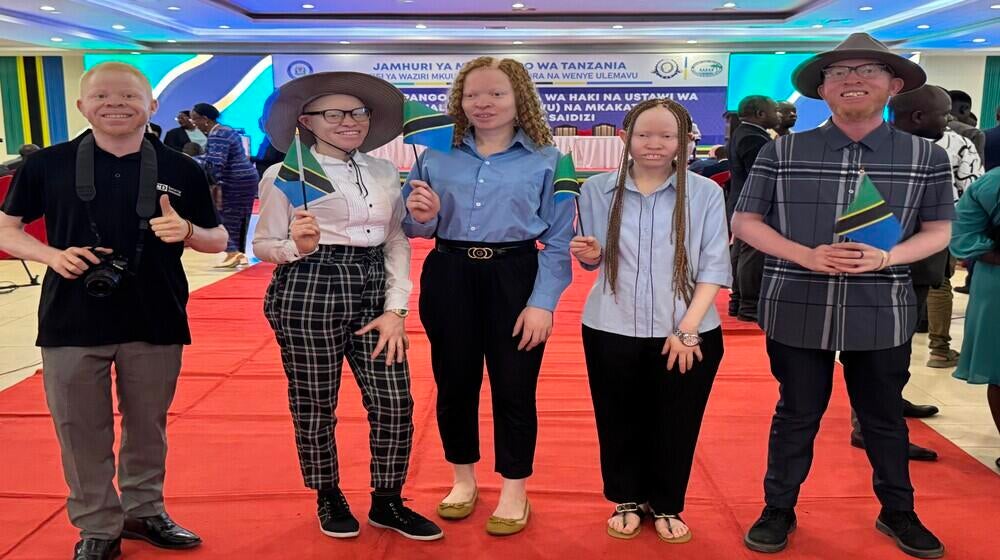A Historic Step Towards Disability-Inclusive Development
Dar es Salaam, Tanzania – December 3, 2024. Today, Tanzania marked the International Day of Persons with Disabilities with a historic milestone in its historic journey towards disability inclusion, unveiling the Tanzania National Action Plan for Persons with Albinism and the National Assistive Technology Strategy for Persons with Disability. Under the 2024 theme, "Building a Sustainable Future Through Disability-Inclusive Development," the launch reflects Tanzania's unwavering commitment to fostering a society where no one is left behind, especially persons with disabilities and persons with albinism.
In his keynote address, His Excellence, Hon. Dotto Mashaka Biteko, Deputy Prime Minister of the United Republic of Tanzania, underscored the country’s resolve to build a future rooted in equity and opportunity for all. He stated:
"Today, we take a monumental step forward in ensuring that persons with disabilities are not only heard but actively included in shaping our nation. These strategies represent our promise to break down barriers, create opportunities, and ensure every Tanzanian, regardless of ability, can live a life of dignity and contribute meaningfully to society. The progress we make here today is progress for the entire nation."
The event also served as a platform to highlight the importance of integrating disability-inclusive policies and systems into every sector of society. Mark Bryan Schreiner, UNFPA Representative in the United Republic of Tanzania, stressed the role of data in driving this change, stating:
"When we prioritize the collection and use of disability-disaggregated data, we demonstrate our commitment to recognizing persons with disabilities as equal partners in building a sustainable, inclusive future. These frameworks are not just documents—they represent our collective determination to create a more equitable society where every individual can thrive."
Tanzania has made remarkable strides in disability inclusion, with achievements that demonstrate the impact of collaboration between the government, UN agencies, and development partners. The integration of disability-inclusive metrics into the 2022 Population and Housing Census has ensured that persons with disabilities are not only counted but that their needs are reflected in national policies. Systems such as the Persons with Disability Management Information System (PD-MIS) on the mainland and JUMUISHI in Zanzibar have improved data collection and management, enabling targeted interventions.
Critical policy reforms, such as the revision of Zanzibar’s Persons with Disabilities Act of 2022, have strengthened protections and representation for persons with disabilities, particularly women and young people. Collaborative initiatives, such as UNFPA’s “Chaguo Langu Haki Yangu” program, have addressed barriers faced by women and youth with disabilities, while UNICEF’s “At Scale” program aims to screen 1 million children and provide assistive devices to those in need.
For Josephine Munganga, a disability rights advocate and person with a disability, the day’s significance was deeply personal. Reflecting on the progress made, she remarked:
"For years, we have been calling for recognition, dignity, and equal opportunity. Today’s launch of these strategies is a beacon of hope. It tells us that our voices are being heard, and that change is not just a promise—it’s a reality we can now touch. As persons with disabilities, we have so much to offer. Inclusion isn’t charity; it’s justice."
The potential of assistive technology to transform lives was another key highlight of the event. The tools and devices encompassed in the National Assistive Technology Strategy promise to revolutionize access to education, communication, and mobility for persons with disabilities. Speaking on the impact of such advancements, Ms Elke Wisch the UNICEF Tanzania Representative said:
"Assistive technology bridges the gap between isolation and inclusion. It allows a child who is deaf to communicate with peers, a child with mobility challenges to navigate their school, and a child with learning disabilities to engage with educational content. These tools are not just devices—they are pathways to opportunity and inclusion."
The launch of these strategies marks a turning point, not only in policy but in societal attitudes toward disability. Hon. Dotto Mashaka Biteko urged all stakeholders to carry forward the momentum generated by this event:
"The future of Tanzania depends on the contributions of every one of its citizens. Let us ensure that no one is left behind. Inclusion is not just about policies—it’s about building a society where everyone is valued and empowered to fulfill their potential. Today’s launch is a call to action for all of us to step up and lead with compassion, commitment, and vision."
As the event concluded, there was a shared sense of hope and determination. The strategies unveiled are more than policy frameworks—they symbolize a collective resolve to break down barriers, uplift voices, and create a society where every person, regardless of their abilities, can achieve their full potential. For Tanzania, this day represents a bold step toward a future of dignity, equity, and inclusion for all.
UNFPA reaffirmed its commitment to continuing its close collaboration with the government, UN agencies, development partners, civil society, and Organizations of persons with disabilities. This partnership aims to ensure that policies and programs uphold the rights of persons with disabilities particularly women and girls, empowering them to live fulfilling and dignified lives. Together, these efforts will pave the way for a more inclusive and equitable Tanzania, where everyone can contribute to and benefit from the country’s progress.
Media Inquiries:
Dr. Warren Bright,
UNFPA Communications Analyst,
United Republic of Tanzania
Mobile: +255 764 43 44 45
Email: bwarren@unfpa.org


